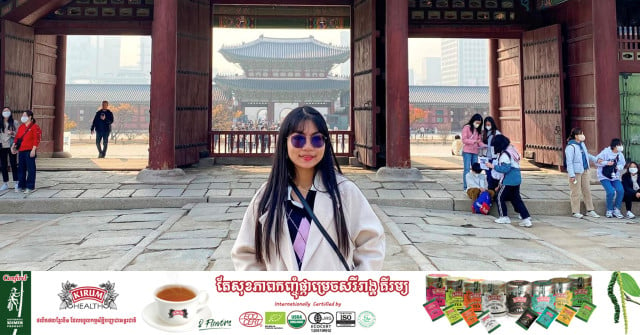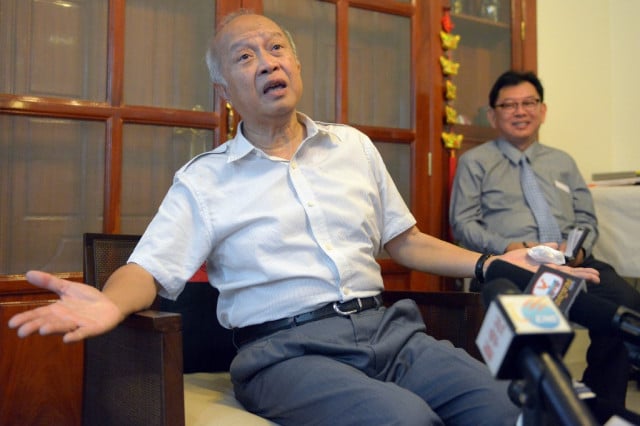“Learning Chinese Opens Job Opportunities in Cambodia”: Student

- By Rin Ousa
- October 16, 2023 10:36 AM
PHNOM PENH – The year 2023 marks the 65th anniversary of the establishment of diplomatic relationships between China and Cambodia. As their bilateral collaboration has strengthened across all sectors, the number of Cambodian students learning Chinese has increased.
Phal Panhanyta is a junior student majoring in Digital Business at the Cambodia Academy of Digital Technology (CADT) and is also pursuing a Bachelor of Arts in Chinese at the Institute of Foreign Languages (IFL) in Phnom Penh. Panhanyta shares her thoughts on the importance of learning Chinese, the challenges and difficulties she has had to overcome, and conveys essential messages to those wishing to take the plunge and commit to learning the language.
Rin Ousa: Why have you decided to learn Chinese?
Phal Panhanyta: It is true that there are many languages spoken globally. However, I made the decision to learn Chinese because it opens many job opportunities here in Cambodia. Being proficient in both English and Chinese can greatly improve my chances of finding a good job. Additionally, I have a fascination with the Chinese language and culture, which motivates me even more. My ultimate goal is not only to communicate effectively in Chinese but also to fully enjoy Chinese movies, connect with new people, and explore Chinese traditions. This journey is not only driven by professional reasons but also by the desire to embrace a new world of language and culture.
Rin Ousa: As a student majoring in Digital Business, why do you think learning Chinese will be useful in your future career?
Phal Panhanyta: As a Digital Business student, I believe that learning Chinese is crucial for my future career. China has a massive and rapidly growing digital market. Knowing Chinese would help me connect with a larger audience, and expand my business opportunities.
Rin Ousa: Chinese has thousands of idioms that one has to remember if one wants to achieve some kind of proficiency. From your point of view, what are the difficulties in learning the language? And what are your practical solutions for dealing with them?
Phal Panhanyta: From my perspective, there are two main challenges when it comes to learning Chinese. The first one is to memorize vocabulary and master Chinese grammar rules, and the second is to successfully express myself and be understood when I’m having conversations with native speakers.
I've used some practical strategies to help me remember words and grammar better. My strategy is to review what I've learned after each class. I've also made my own flashcards to help me remember things, and I quiz myself when I have spare time. This strategy is very beneficial to build a strong foundation in Chinese. To get better at speaking, I watch videos in Chinese. They show me how native speakers talk and use different words. Then, I practice what I've learned by talking to myself or other people who I can talk to. This helps me improve my conversation skills and even makes me feel more confident.
Rin Ousa: From your perspective, what are the benefits of the Chinese language to Cambodia as a whole?
Phal Panhanyta: First of all, it opens up opportunities for enhanced economic cooperation and trade with China, which is one of the major global economic players in the world. People with proficiency in Chinese can do business and collaborate better with Chinese companies, which results in contributing to Cambodia's economic growth.
Secondly, the ability to speak Chinese can promote cultural exchange and tourism. Many Chinese are used to visiting Cambodia, so a shared language can foster better understanding and connections between these two nations, leading to increased tourism and cultural exchanges.
Furthermore, Chinese language skills can provide Cambodians with access to educational opportunities, as many Chinese universities and institutions offer scholarships and programs to international students. This can benefit Cambodian students and professionals seeking to expand their knowledge and skills abroad. Upon completing their studies, they can return to Cambodia equipped with newfound knowledge and skills, contributing to the country's development and growth.
Rin Ousa: What problems do you have while conversing with Chinese people?
Phal Panhanyta: I often find myself facing some communication challenges. Some of them talk very fast and their accents can be different from what I learned, making it very challenging for me to keep up. Comprehending the main points of the communication, expressing myself and engaging in back-and-forth conversations can be a bit tricky for me. To overcome these challenges, I'm actively working on improving my listening skills and becoming more comfortable with different accents and speeds to enhance the effectiveness of my conversations with Chinese speakers.
Rin Ousa: As a student studying in two universities, how do you keep-up with all the work you have to do?
Phal Panhanyta: Balancing a full-day CADT class with an evening IFL class is a time management challenge when it comes to assignments and exam preparation. Also, my long schedule, from 8:30 a.m. to 8:30 p.m. always leads to fatigue at the end of the day. In addition, I need to manage time for my volunteer work as well as for further self-development.
To deal with those challenges, it's important for me to prioritize time management. I create a detailed schedule that allocates specific time for coursework from both universities to help balance the workload. Breaking down assignments into smaller ones can also help me manage tasks without making them overwhelming. To deal with the long daily schedule, I usually take short breaks to take a quick nap throughout the day to recharge myself. Importantly, I also prioritize self-care by getting enough sleep, engaging in regular exercise, and managing stress for the well-being of my mental and physical health.
Rin Ousa: Do you have any messages for those who are considering studying Chinese?
Phal Panhanyta: My message is “Don't hesitate and start now”. Although learning along the way can be a challenge, it can be an experience that opens doors to a fascinating culture and global opportunities. Just start small, practice regularly, and trust the process. Most importantly, enjoy the journey. It's not just about the language, it's about exploring a rich culture and growing personally. So, go ahead and give it a try, the opportunities await you.















